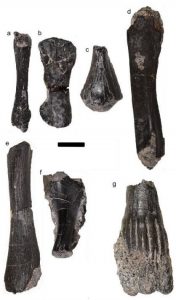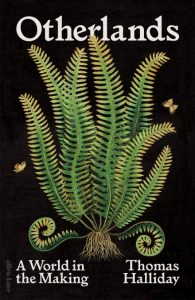Current MSc student has just published work from a project she did last summer before starting the degree programme. She was working on an example of the latest Triassic Rhaetian bonebed from a site near Gloucester, called Westbury Garden Cliff. This classic site had first yielded fossil reptiles and fishes as long ago as the 1840s, but had not received modern study.
 Harriet worked on specimens from Bristol City Museum as well as newly collected materials. During field work, Harriet noted large numbers of burrows and trails made by worms, clams, and king crabs. In fact, the king crab tracks and resting marks show that this had become a tidal zone, where the sea flooded in and out.
Harriet worked on specimens from Bristol City Museum as well as newly collected materials. During field work, Harriet noted large numbers of burrows and trails made by worms, clams, and king crabs. In fact, the king crab tracks and resting marks show that this had become a tidal zone, where the sea flooded in and out.
The Rhaetian Transgression flooded across Europe and brought with it sharks, bony fishes and marine reptiles. One of the most exciting finds from the site is the small marine reptile Pachystropheus. This slender reptile was less than a metre long, like a long-necked salamander, chasing fish through the shallow waters.
Harriet’s paper is published in Proceedings of the Geologists’ Association, and the University of Bristol also produced a press release.


 om Halliday, who completed the MSc in 2011, has just published his first book, ‘Otherlands’ to high critical acclaim. The publisher, Allen Lane-Penguin, provide this blurb, “Otherlands is an epic, exhilarating journey into deep time, showing us the Earth as it used to exist, and the worlds that were here before ours. Travelling back in time to the dawn of complex life, and across all seven continents, award-winning young palaeobiologist Thomas Halliday gives us a mesmerizing up close encounter with eras that are normally unimaginably distant.
om Halliday, who completed the MSc in 2011, has just published his first book, ‘Otherlands’ to high critical acclaim. The publisher, Allen Lane-Penguin, provide this blurb, “Otherlands is an epic, exhilarating journey into deep time, showing us the Earth as it used to exist, and the worlds that were here before ours. Travelling back in time to the dawn of complex life, and across all seven continents, award-winning young palaeobiologist Thomas Halliday gives us a mesmerizing up close encounter with eras that are normally unimaginably distant.